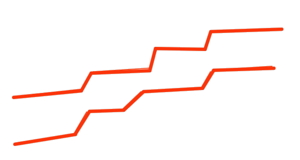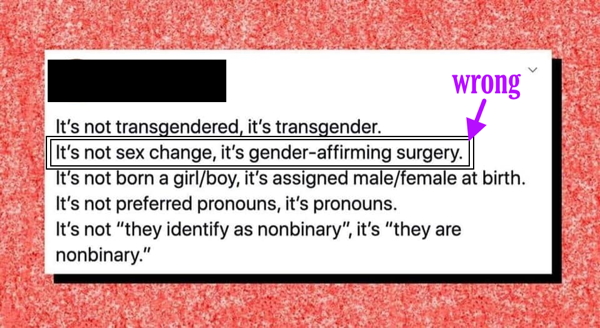The Paradox of Male Identity & Bonding
Feb. 10th, 2023 05:16 pmSo imagine that you're having a conversation with a male who identifies as a feminist. He sees patriarchy as a male alliance and his fervent disavowal of patriarchy as a breaking of that alliance. He's not with the men, he's a feminist.
Now let's have a different conversation, this time with an AMAB person, an assigned male at birth person in other words, who identifies as a woman. She doesn't talk about patriarchy but rather emphasizes that who she is, and hence who she sees as "the people like me", are women, not men. She's not with the men, either, she's a woman.
With me so far?
But now let's talk about the male bonding that neither of those people are a part of, the connections between men. Norah Vincent, author of Self-Made Man, and Anna Akana, creator of YouTube video "How Trans Men Expose Female Privilege" about Zac, a trans man, both emphasize the same point: that men don't have much of any kind of bonding with each other, that they live their lives pretty isolated, really.
How do you distinguish yourself from a population that others may have viewed you as a member of -- that you have been altercast or miscategorized as -- if among that population's main characteristics is the fact that its members push away from each other and don't bond?
If that's just one characteristic in a mosaic of many, I suppose we could say we have that in common with the men we don't consider ourselves a part of, but that we're still different in important ways that make us not a part of them.
If it's definitive, though... the more important this particular characteristic is in considering what a man is, the more our doing it too means we're just like the rest of men.
I get a lot of responses to my assertions of my gender identity that are dismissive. One message board participant informed me,
Predictably, I found that annoying; it angered me, I felt erased. But that doesn't make him wrong, and I should be willing to explore that, whether it pisses me off or not.
What if it is entirely normative for male people (at least heterosexual male poeple) to consider ourselves different from male people in general, to reject an identity-in-common with other males, to consider ourselves more like one of the women, and to only seek connections with people we think of as people like ourselves from among our female acquaintances? I've certainly heard from some of my female intimates and friends and colleagues that they get the sense that women are the only people that a lot of men open up to and share their innermost thoughts with.
It would be very disconcerting to wake up one day and realize that instead of having an identity different from that of most males, the notion of being different from most males is exactly what most men have in common?!?
But no, I don't think that's an accurate read of things. I believe there is a meaningful difference between not really sharing or letting other males know what you're feeling and thinking, but hiding that with a veneer of conformity and endorsement of a bunch of mainstream notions of what all men have in common, on the one hand, and being pretty open and honest (to other males and to non-male people as well) about what one feels and thinks about personal matters, especially these expectations and suppositions and how far they stray from our personal experience and interests and desires, and yet not finding much resonance from most other male people when we do so, on the other hand.
I would actually like to truly compare notes with other male people about what it's like for them and for me. Not just other self-identifying atypical males, genderqueer or otherwise...but any and all of them. It might or might not increase a sense of identity-in-common. We don't have to all be the same in order to not be hostile to those who differ. That's something that can be difficult to understand when you're in sixth grade, that someone else could look upon you and express "I am not like you and I sure wouldn't want to be" without it being a judgment, a derogatory assessment.
I encountered genuine hostility, with violence and hate and disgust, but to be fair I reacted to their expression of "I am not like you and wouldn't want to be" as a hostile expression, and was expressing the same back at them in return.
But if every male wants out of the identity foisted upon us, before we can bond over that we have to talk about it.
And if you don't ever want to talk about it, I have to assume you don't experience it as a problem, and that does make us different.
—————
My first book, GenderQueer: A Story From a Different Closet, is published by Sunstone Press. It is available on Amazon and Barnes & Noble in paperback, hardback, and ebook, and as ebook only from Apple, Kobo, and directly from Sunstone Press themselves.
My second book, That Guy in Our Women's Studies Class, has also now been published by Sunstone Press. It's a sequel to GenderQueer. It is available on Amazon and on Barnes & Noble in paperback and ebook, and as ebook only from Apple, Kobo, and directly from Sunstone Press themselves.
My third book is deep in second draft, and I'm seeking more beta readers for feedback. It is provisionally titled Within the Box and is set in a psychiatric/rehab facility and is focused on self-determination and identity. Chronologically, it fits between the events in GenderQueer and those described in Guy in Women's Studies; unlike the other two, it is narrowly focused on events in a one-month timeframe and is more of a suspense thriller, although like the other two is also a nonfiction memoir.Contact me if you're interested.
Links to published reviews and comments are listed on my Home Page, for both published books.
———————
This DreamWidth blog is echoed on LiveJournal and WordPress. Please friend/link me from any of those environments on which you have an account.
————————
Index of all Blog Posts
Now let's have a different conversation, this time with an AMAB person, an assigned male at birth person in other words, who identifies as a woman. She doesn't talk about patriarchy but rather emphasizes that who she is, and hence who she sees as "the people like me", are women, not men. She's not with the men, either, she's a woman.
With me so far?
But now let's talk about the male bonding that neither of those people are a part of, the connections between men. Norah Vincent, author of Self-Made Man, and Anna Akana, creator of YouTube video "How Trans Men Expose Female Privilege" about Zac, a trans man, both emphasize the same point: that men don't have much of any kind of bonding with each other, that they live their lives pretty isolated, really.
How do you distinguish yourself from a population that others may have viewed you as a member of -- that you have been altercast or miscategorized as -- if among that population's main characteristics is the fact that its members push away from each other and don't bond?
If that's just one characteristic in a mosaic of many, I suppose we could say we have that in common with the men we don't consider ourselves a part of, but that we're still different in important ways that make us not a part of them.
If it's definitive, though... the more important this particular characteristic is in considering what a man is, the more our doing it too means we're just like the rest of men.
I get a lot of responses to my assertions of my gender identity that are dismissive. One message board participant informed me,
"I would consider Trans people as the Gender they feel they are, whether they've had surgery or not. That isn't at all relelvant to your case because YOU AREN'T TRANS! Transgendered people try to live as their preferred gender to the best their social and financial circumstances permit. If they can, they will fully transition, though sadly that isn't possible for a lot of people. You aren't doing that...
All I'm seeing is a straight male who doesn't conform to certain dubious stereotypes of straight maleness and who caught a lot of unfortunate shit in high school because of it. Having gotten some of that myself, I certainly sympathize, but it doesn't make you anything more than a non-conformist."
Predictably, I found that annoying; it angered me, I felt erased. But that doesn't make him wrong, and I should be willing to explore that, whether it pisses me off or not.
What if it is entirely normative for male people (at least heterosexual male poeple) to consider ourselves different from male people in general, to reject an identity-in-common with other males, to consider ourselves more like one of the women, and to only seek connections with people we think of as people like ourselves from among our female acquaintances? I've certainly heard from some of my female intimates and friends and colleagues that they get the sense that women are the only people that a lot of men open up to and share their innermost thoughts with.
It would be very disconcerting to wake up one day and realize that instead of having an identity different from that of most males, the notion of being different from most males is exactly what most men have in common?!?
But no, I don't think that's an accurate read of things. I believe there is a meaningful difference between not really sharing or letting other males know what you're feeling and thinking, but hiding that with a veneer of conformity and endorsement of a bunch of mainstream notions of what all men have in common, on the one hand, and being pretty open and honest (to other males and to non-male people as well) about what one feels and thinks about personal matters, especially these expectations and suppositions and how far they stray from our personal experience and interests and desires, and yet not finding much resonance from most other male people when we do so, on the other hand.
I would actually like to truly compare notes with other male people about what it's like for them and for me. Not just other self-identifying atypical males, genderqueer or otherwise...but any and all of them. It might or might not increase a sense of identity-in-common. We don't have to all be the same in order to not be hostile to those who differ. That's something that can be difficult to understand when you're in sixth grade, that someone else could look upon you and express "I am not like you and I sure wouldn't want to be" without it being a judgment, a derogatory assessment.
I encountered genuine hostility, with violence and hate and disgust, but to be fair I reacted to their expression of "I am not like you and wouldn't want to be" as a hostile expression, and was expressing the same back at them in return.
But if every male wants out of the identity foisted upon us, before we can bond over that we have to talk about it.
And if you don't ever want to talk about it, I have to assume you don't experience it as a problem, and that does make us different.
—————
My first book, GenderQueer: A Story From a Different Closet, is published by Sunstone Press. It is available on Amazon and Barnes & Noble in paperback, hardback, and ebook, and as ebook only from Apple, Kobo, and directly from Sunstone Press themselves.
My second book, That Guy in Our Women's Studies Class, has also now been published by Sunstone Press. It's a sequel to GenderQueer. It is available on Amazon and on Barnes & Noble in paperback and ebook, and as ebook only from Apple, Kobo, and directly from Sunstone Press themselves.
My third book is deep in second draft, and I'm seeking more beta readers for feedback. It is provisionally titled Within the Box and is set in a psychiatric/rehab facility and is focused on self-determination and identity. Chronologically, it fits between the events in GenderQueer and those described in Guy in Women's Studies; unlike the other two, it is narrowly focused on events in a one-month timeframe and is more of a suspense thriller, although like the other two is also a nonfiction memoir.Contact me if you're interested.
Links to published reviews and comments are listed on my Home Page, for both published books.
———————
This DreamWidth blog is echoed on LiveJournal and WordPress. Please friend/link me from any of those environments on which you have an account.
————————
Index of all Blog Posts




